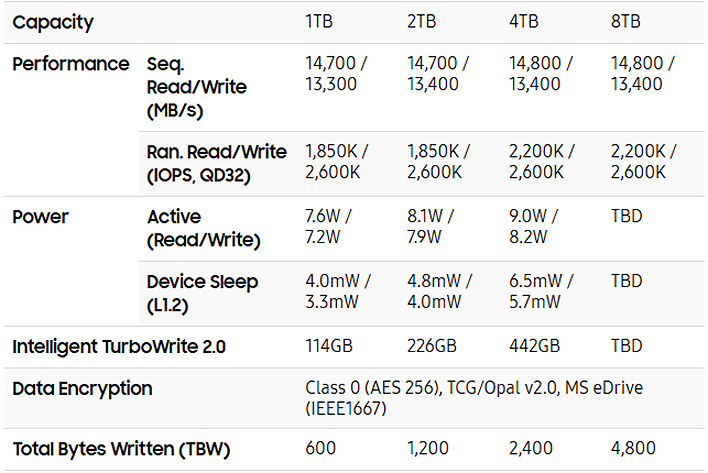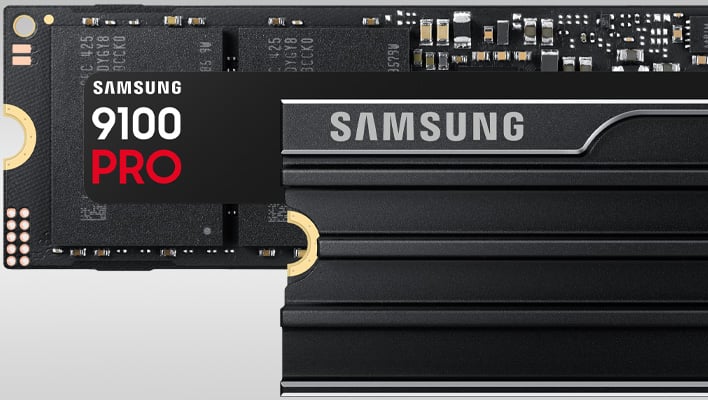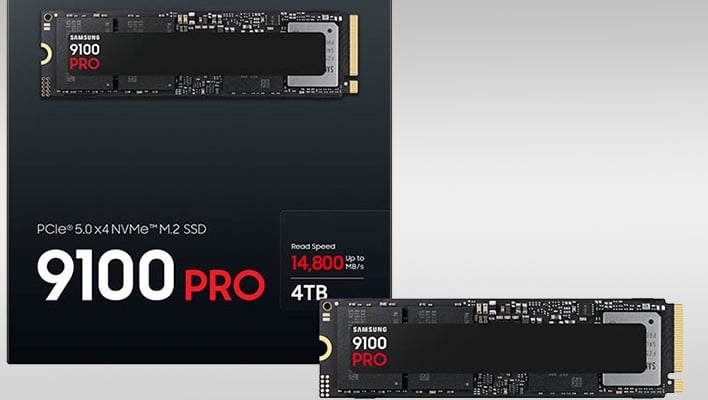Samsung is rolling out a new flagship solid state drive (SSD) series, the 9100 Pro, to replace the excellent
990 Pro at the top of its consumer storage totem pole. Part of what makes it Samsung's fastest SSD series to date is that it's the company's first consumer storage solution to hitch its wagon to the PCI Express 5.0 bus, which in turn enables much higher throughput than what's possible with PCIe 4.0.
At full bore, an NVMe Gen5 SSD has access to around 15.75GB/s. That doesn't take into account overhead, but just as we saw in PCIe 4.0 territory, drive makers will push the envelope to get as close to the maximum speed as possible. In this case, the 9100 Pro is rated to deliver sequential reads of up to 14.8GB/s (14,800MB/s) and sequential writes of up to 13.4GB/s (13,400MB/s).
The precise speed metrics vary a little by capacity, with Samsung offering its new flagship storage in 1TB, 2TB, 4TB, and 8TB sizes. Here's a high level overview...
One thing that stands out is that the sequential read and write ratings are similar across the board. That's not usually the case—typically we see a one or the other (or both) take a significant hit at lower capacities, which can be a double whammy because those are also the more affordable options.
Same goes for the 4K random read and write ratings. There's a mild drop of 4K random reads for the 2TB and 1TB models, but nothing egregious. Meanwhile, the 4K random writes are identical across the board. For typical workloads (gaming included), random read and write performance is more important than sequential performance.
In totality, Samsung nearly doubled the rated performance compared to the 990 Pro. It also doubled the maximum capacity (8TB versus 4TB). We're currently putting a model through its paces for a formal review, so stay tuned to see how real-world performance compares with Samsung's advertised specs.
"From AI-driven creators shaping the future to gamers pushing the limits, we saw a clear need for innovation to support users who need more forward-thinking memory technology as they push the bounds of what’s possible in their work," said Jim Kiczek, Vice President of Memory Product Marketing at Samsung Electronics America. "The 9100 PRO SSD establishes a new era of performance to help them achieve exactly that. With more storage, even better speeds, improved power efficiency and seamless reliability, the lineup empowers users to continue innovating without storage limitations."
Samsung's also touting up to 49% better power efficiency, thanks to the use of an advanced 5-nanometer controller designed in-house. This is paired with Samsung's V8 triple-level cell (TLC) vertical NAND (V-NAND) flash memory. This also suggests that an even faster drive line could be in store, as Samsung began mass producing one-terabit (1Tb)
V9 TLC V-NAND last June.
Here's how pricing breaks down, with Samsung offering the 9100 Pro with or without a heatsink...
- 8TB Samsung 9100 Pro w/ heatsink: TBD
- 8TB Samsung 9100 Pro: TBD
- 4TB Samsung 9100 Pro w/ heatsink: $569.99
- 4TB Samsung 9100 Pro: $549.99
- 2TB Samsung 9100 Pro w/ heatsink: $319.99
- 2TB Samsung 9100 Pro: $299.99
- 1TB Samsung 9100 Pro w/ heatsink: $219.99
- 1TB Samsung 9100 Pro: $199.99
Samsung says the
9100 Pro in 1TB, 2TB, and 4TB capacities will be available in March, followed by 8TB variants sometime in the second half of 2025.
Meanwhile, if you don't need the kind of speed that's on tap, the still-fast 990 Pro can be had at some great discounts on Amazon right now...
It's possible (and we'd say likely) that the 9100 Pro prices will come down in short order, though the MSRPs are in the ballpark of high-end solutions from competitors like Crucial (a Micron brand) and Corsair.





